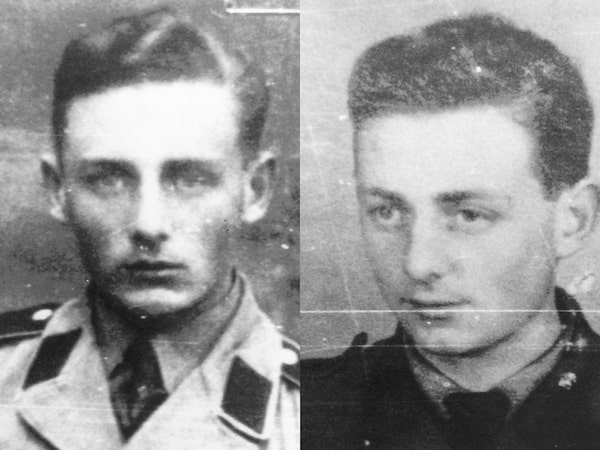
Wartime photos of Helmut Oberlander.Ontario Jewish Archives
Helmut Oberlander, the last Canadian facing allegations connected to Nazi war crimes, has died just as the federal government was in the final stage of its decades-long efforts to deport him.
Mr. Oberlander, who was 97, died on Monday at home. For 26 years, Ottawa had tried to expel him, saying he unlawfully immigrated to Canada after the Second World War because he had concealed his role as an interpreter for a Nazi death squad during Germany’s invasion of the Soviet Union.
While his family portrayed him as a community-minded businessman, others saw his case as an example of Ottawa’s failure to deal with suspected Nazi collaborators.
Accused in Nazi war crimes case may die before deportation
“Notwithstanding the challenges in his life, he remained strong in his faith. He took comfort in his family and the support of many in his community,” the Oberlander family said in a statement.
The lessons of Mr. Oberlander’s death ought to be immediately clear to all Canadians, said Irwin Cotler, a former Liberal MP who served as justice minister in the mid-2000s. “We need to revisit the whole process of bringing war criminals to justice,” he said.
Irwin Cotler, an international human rights lawyer and former justice minister at his home in Montreal on Sep. 3, 2020. Mr. Cotler said the newly elected Liberal government should look at creating an interministerial panel to streamline legal processes so that human-rights abusers who enter Canada from foreign conflicts will not be as able to run out the clock if they are caught.Andrej Ivanov/The Globe and Mail
Told by The Globe and Mail of Mr. Oberlander’s death, Mr. Cotler recalled that “the case reflected a pattern of delay such that justice ended up never being, in fact, served.”
Mr. Cotler said the newly elected Liberal government should look at creating an interministerial panel to streamline legal processes so that human-rights abusers who enter Canada from foreign conflicts will not be as able to run out the clock if they are caught.
“We have war criminals residing in Canada from different killing fields,” Mr. Cotler said. “We have neither the investigative capacity nor the legal remedial approach to do what has to be done as effectively as possible.”
A Waterloo, Ont., real estate developer, Mr. Oberlander was the last of 12 Canadians who were alleged to have been involved with Second World War atrocities, but died in old age before the federal government could complete the legal proceedings to deport them.
The government began removal proceedings against him about half a century after the end of the war. The ensuing court battle lasted more than a quarter of a century.
Mr. Oberlander’s case was sent this year to the federal Immigration and Refugee Board, for a deportation hearing, after he had run out of avenues of judicial appeals.
The IRB held two days of hearings this month, then postponed to consider motions by Mr. Oberlander’s lawyers. Documents they filed to the tribunal said his death was imminent. “He is near the end of life,” read a submission from a geriatric doctor. On Wednesday, one of Mr. Oberlander’s lawyers, Ronald Poulton, notified the IRB of his client’s death. “I submit that this matter is now moot,” he wrote.
An ethnic German born in Ukraine, Mr. Oberlander worked as an interpreter for a subunit of the Einsatzgruppen, the Nazi killing squads that followed front-line troops into the Soviet Union and slaughtered more than a million people.
He said that he had been conscripted as an auxiliary and didn’t take part in killings. “I was only 17 years old – I was only a kid,” he told RCMP officers who interviewed him in 1995.
Canadian courts ruled, however, that he should not have been allowed into Canada or granted citizenship because his work contributed to the aims of the death squads.
He immigrated to Canada in 1954 and became a citizen in 1960. The RCMP got its first tip about him in 1963 but deemed that there wasn’t ground for criminal charges.
In 1994, Canada’s Supreme Court upheld the acquittal of Imre Finta, a former Hungarian gendarme criminally charged for his role in the deportation of Jews to death camps in 1944.
The Finta decision set the bar for criminal convictions so high that Ottawa shifted its strategy to civil proceedings, aiming instead to strip Nazi-era suspects of their Canadian citizenship, then ship them back to Europe.
Mr. Oberlander’s case fit into that new legal framework so, in 1995, Ottawa launched denaturalization and deportation proceedings against him.
He was stripped of his Canadian citizenship in 2001 but he applied for a judicial review. His citizenship was revoked three more times – in 2007, 2012 and 2017 – and each time he appealed.
In an interview with the Waterloo Region Record in 2000, Mr. Oberlander had vowed, “I will fight this case until death do us part, or until I run out of money and have to put a mortgage on my house, whatever comes first.”
Our Morning Update and Evening Update newsletters are written by Globe editors, giving you a concise summary of the day’s most important headlines. Sign up today.